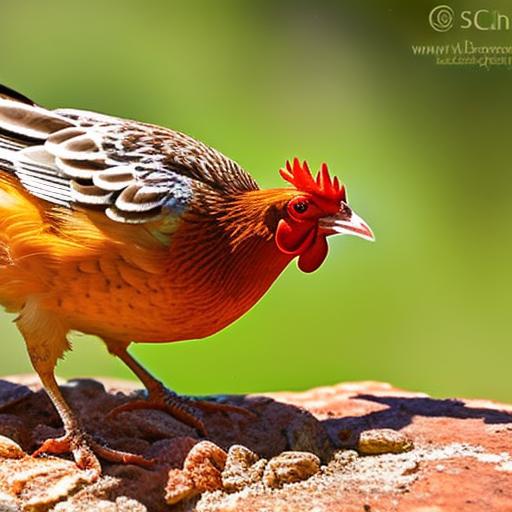Arizona’s hot climate can be tough on chickens. With temperatures often reaching well over 100 degrees Fahrenheit during the summer months, it is essential to take measures to keep your flock cool and comfortable. Heat stress can lead to a variety of health issues for chickens, including dehydration, heat stroke, and even death. By understanding the importance of keeping chickens cool and implementing the right strategies, you can ensure the health and well-being of your flock.
Key Takeaways
- Keeping chickens cool in Arizona is crucial for their health and well-being.
- Providing adequate shade is key to protecting chickens from the sun’s harmful rays.
- Ensuring your flock stays hydrated is essential in hot weather.
- Choosing the right feed can help keep chickens cool and comfortable.
- Proper ventilation is necessary for good airflow and your chicken’s health.
Providing Adequate Shade: The Key to Keeping Your Chickens Safe from the Sun
Shade is crucial for protecting chickens from the sun’s harmful rays. Direct sunlight can quickly raise the temperature inside a chicken coop or run, making it unbearable for the birds. To provide adequate shade, consider planting trees or installing shade cloth over your chicken run. This will help to block out the sun and create a cooler environment for your flock.
In addition to providing shade in the run, it is also important to create shade inside the coop. This can be done by installing windows or vents that can be opened to allow for airflow while still providing shade. You can also hang curtains or shades on the windows to block out direct sunlight during the hottest parts of the day.
Watering Your Flock: How to Ensure Your Chickens Stay Hydrated in the Heat
Chickens need plenty of water to stay cool and hydrated in hot weather. Make sure to provide clean, cool water at all times. Consider using a waterer with a large capacity so that you don’t have to refill it as frequently. It is also important to regularly clean and refill the waterer to prevent bacteria growth.
To keep the water cool, you can add ice cubes or freeze water bottles and place them in the waterer. This will help to lower the temperature of the water and keep it refreshing for your flock. Additionally, consider placing multiple waterers throughout the coop and run to ensure that all chickens have easy access to water.
Choosing the Right Feed: Tips for Selecting Feeds that Keep Your Chickens Cool
| Feed Type | Benefits | Drawbacks |
|---|---|---|
| Crumbles | Easy to digest, less wastage, good for young chicks | May not provide enough fiber for adult chickens |
| Pellets | Less wastage, more uniform nutrition, good for adult chickens | May be harder to digest for young chicks, may require more water intake |
| Mash | Easy to digest, good for chickens with beak or crop issues | May be more wasteful, may require more frequent cleaning of feeders |
| Scratch Grains | Good foraging activity, provides variety in diet | May not provide enough nutrition, may lead to obesity if overfed |
Certain feeds can help keep chickens cool and healthy in hot weather. Look for feeds that are specifically formulated for hot climates. These feeds often contain ingredients that help to regulate body temperature and promote hydration. Avoid feeding your flock heavy or high-protein feeds during the summer months, as these can increase body heat production.
In addition to selecting the right feed, it is important to monitor your flock’s eating habits during hot weather. Chickens may eat less during extreme heat, so make sure to provide smaller, more frequent meals throughout the day. This will help to ensure that your flock is getting the nutrients they need while also preventing overeating.
Proper Ventilation: Why Good Airflow is Essential for Your Chicken’s Health
Good ventilation is crucial for keeping chickens healthy in hot weather. Proper airflow helps to remove excess heat and moisture from the coop, creating a more comfortable environment for your flock. Make sure that your coop has adequate ventilation openings, such as windows or vents, that can be opened and closed as needed.
It is also important to consider the placement of your coop. Avoid placing it in direct sunlight or in areas with poor airflow, such as low-lying areas or near buildings or trees that block the wind. By ensuring good airflow in and around the coop, you can help to prevent heat buildup and keep your chickens cool.
Cooling Strategies: Effective Techniques for Lowering the Temperature in Your Coop

There are several strategies for keeping your chicken coop cool in hot weather. One effective technique is to use fans to circulate air and create a cooling breeze. Place fans strategically throughout the coop, aiming them towards areas where chickens spend the most time. This will help to lower the temperature and keep your flock comfortable.
Another cooling technique is to use misters or sprinklers to create a fine mist of water in the coop or run. This can help to lower the temperature and provide relief from the heat. Make sure to use a timer or set up a system that automatically turns on the misters at regular intervals to ensure that your flock stays cool throughout the day.
Managing Your Flock’s Schedule: How to Adjust Your Routine to Keep Your Chickens Comfortable
Adjusting your flock’s schedule can help keep them comfortable in hot weather. Consider changing feeding and watering times to early morning or late evening when temperatures are cooler. This will help to prevent your flock from overheating while eating or drinking.
You can also adjust their free-ranging time to early morning or late evening when temperatures are more tolerable. This will allow them to enjoy some time outside without being exposed to the hottest parts of the day. Make sure to provide plenty of shade and water during their free-ranging time to keep them cool and hydrated.
Health Concerns: Identifying and Treating Heat-Related Illnesses in Chickens
Chickens can suffer from heat-related illnesses in hot weather. Heat stress, dehydration, and heat stroke are common health issues that can occur if chickens are not kept cool and hydrated. It is important to monitor your flock for signs of distress, such as panting, lethargy, or loss of appetite.
If you suspect that a chicken is suffering from heat-related illness, immediately move them to a cooler area and provide them with cool water. You can also wet their feathers with cool water or place them in a shallow pan of water to help lower their body temperature. If symptoms persist or worsen, it is important to seek veterinary care as soon as possible.
Preparing for Extreme Heat: What to Do When Temperatures Soar
Extreme heat can be dangerous for chickens. When temperatures soar above 110 degrees Fahrenheit, it is important to take extra precautions to keep your flock safe. Consider moving your chickens to a cooler location, such as a basement or garage, if possible. If you are unable to move them indoors, provide additional shade and cooling techniques, such as fans or misters.
It is also important to regularly check on your flock during extreme heat and monitor them for signs of distress. Make sure that they have access to plenty of cool water and provide electrolytes or vitamins in their water to help prevent dehydration. If necessary, consider reducing their feed intake during extreme heat to help lower their body heat production.
Keeping Your Chickens Happy and Healthy in the Arizona Sun
Keeping chickens cool and healthy in hot weather requires some effort, but it’s worth it. By providing adequate shade, clean water, the right feed, proper ventilation, and implementing cooling strategies, you can ensure the well-being of your flock. Additionally, adjusting your flock’s schedule and being vigilant about heat-related illnesses will help to keep them comfortable and safe.
With the right strategies and techniques, you can keep your flock happy and healthy all summer long. Remember to monitor your chickens closely during extreme heat and be prepared to take additional measures to keep them cool. By prioritizing their well-being and implementing these tips, you can enjoy the benefits of raising chickens in Arizona without compromising their health.
If you’re looking for tips on how to keep chickens cool in Arizona, you might find this article on the Poultry Wizard website helpful: How to Insulate a Chicken Coop. Insulating your chicken coop can help regulate the temperature and protect your chickens from extreme heat. This article provides step-by-step instructions and valuable insights on insulating your coop effectively. Don’t let the scorching Arizona sun affect your feathered friends – check out this article for some useful tips!
FAQs
What is the ideal temperature range for chickens?
Chickens are comfortable in temperatures ranging from 50-80 degrees Fahrenheit. Anything above 90 degrees Fahrenheit can be dangerous for them.
What are the signs of heat stress in chickens?
Signs of heat stress in chickens include panting, lethargy, loss of appetite, decreased egg production, and even death.
How can I keep my chickens cool in Arizona?
You can keep your chickens cool in Arizona by providing shade, plenty of fresh water, and good ventilation in their coop. You can also use misters or fans to help lower the temperature.
What kind of shade is best for chickens?
The best kind of shade for chickens is natural shade from trees or bushes. You can also use tarps or shade cloth to create shade over their coop or run.
How often should I change my chickens’ water in hot weather?
You should change your chickens’ water at least twice a day in hot weather to ensure that it stays fresh and cool.
Can I give my chickens ice water to cool them down?
No, you should not give your chickens ice water to cool them down. Cold water can shock their system and cause them to go into shock. Instead, provide them with cool, fresh water.
What should I do if I suspect my chickens are suffering from heat stress?
If you suspect your chickens are suffering from heat stress, move them to a cooler area immediately and provide them with cool water. You can also try to cool them down with a fan or misters. If their condition does not improve, contact a veterinarian.
Meet Walter, the feathered-friend fanatic of Florida! Nestled in the sunshine state, Walter struts through life with his feathered companions, clucking his way to happiness. With a coop that’s fancier than a five-star hotel, he’s the Don Juan of the chicken world. When he’s not teaching his hens to do the cha-cha, you’ll find him in a heated debate with his prized rooster, Sir Clucks-a-Lot. Walter’s poultry passion is no yolk; he’s the sunny-side-up guy you never knew you needed in your flock of friends!







